人教版(新课标)高中英语选修七Unit4 Sharing warming up &Reading课件2(35张ppt)
文档属性
| 名称 | 人教版(新课标)高中英语选修七Unit4 Sharing warming up &Reading课件2(35张ppt) | 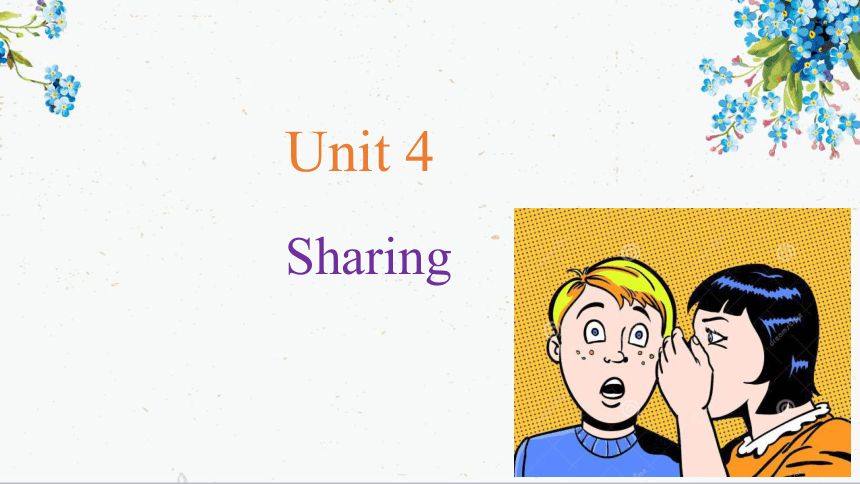 | |
| 格式 | zip | ||
| 文件大小 | 1.4MB | ||
| 资源类型 | 教案 | ||
| 版本资源 | 人教版(新课程标准) | ||
| 科目 | 英语 | ||
| 更新时间 | 2021-04-15 09:45:42 | ||
图片预览

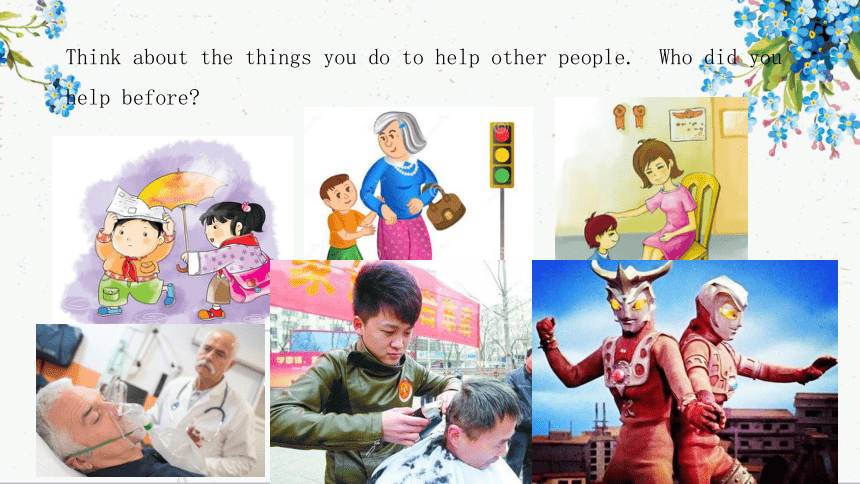
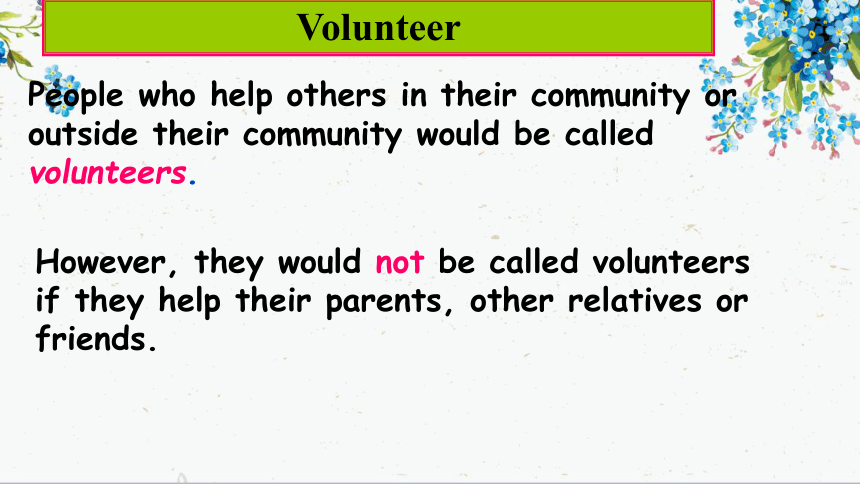

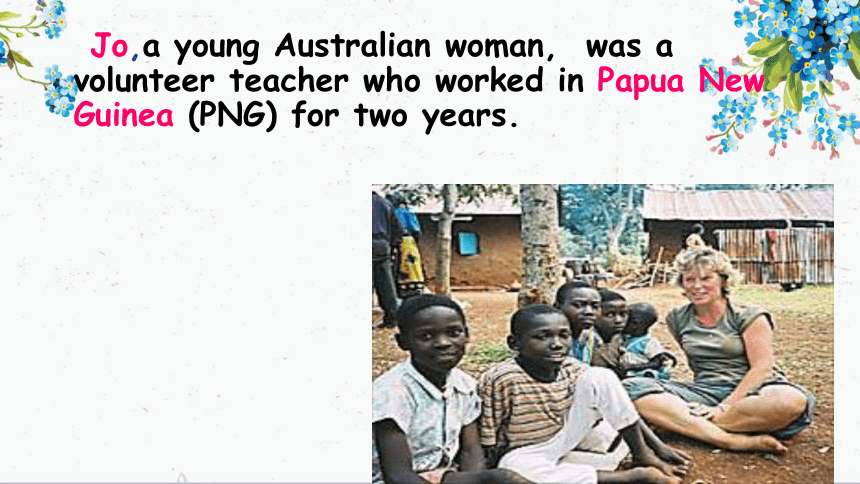

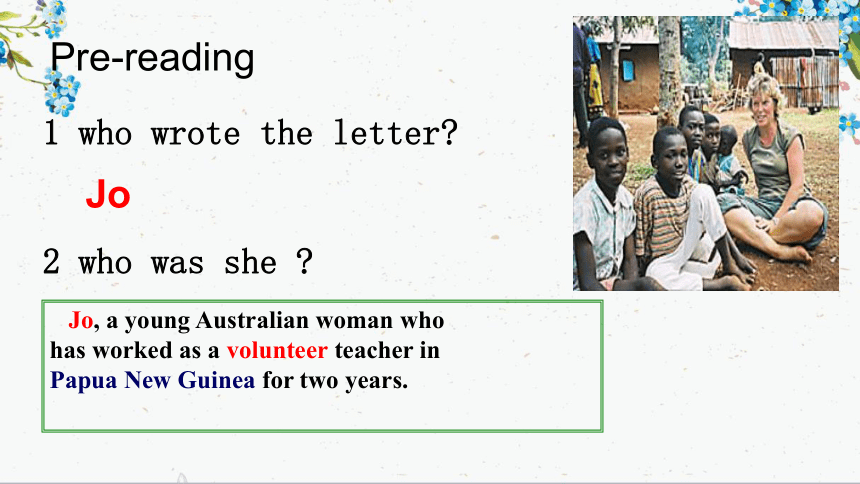

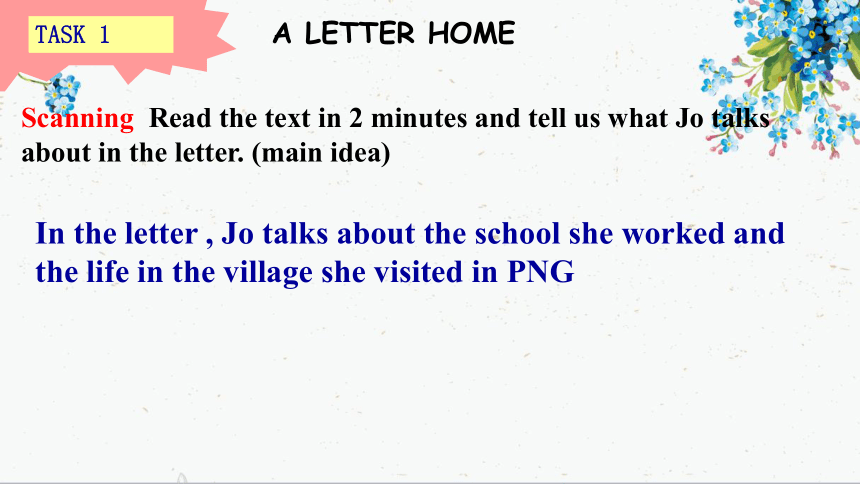
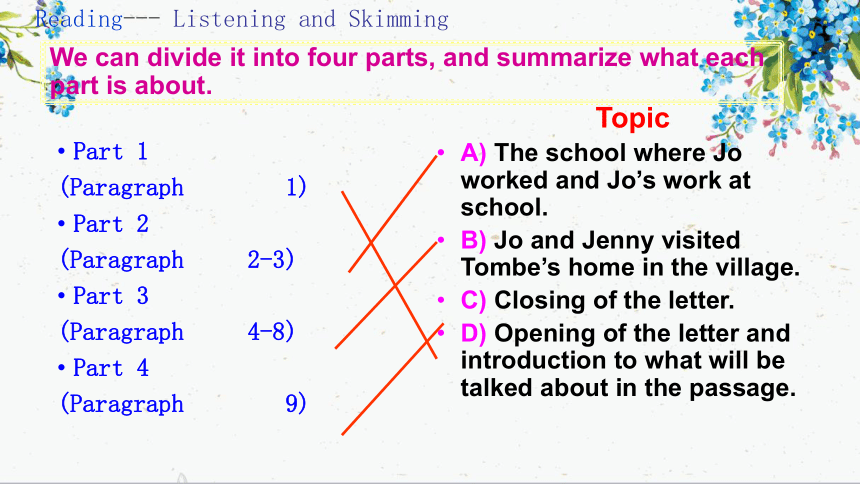
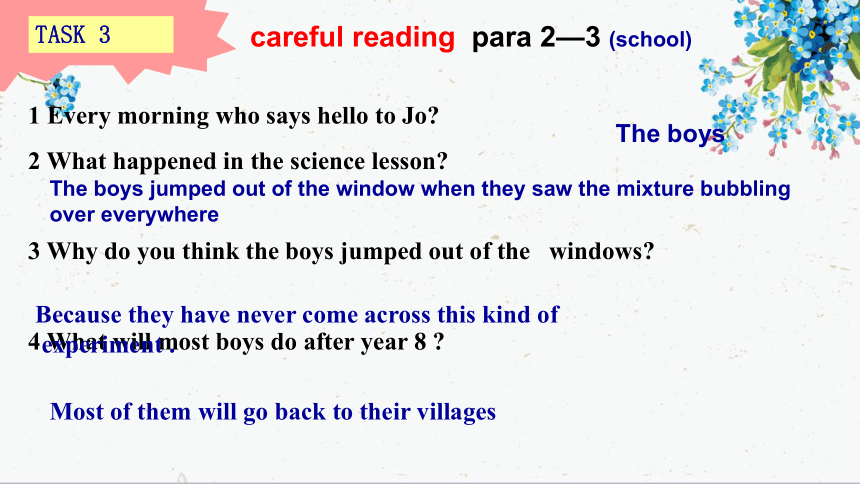
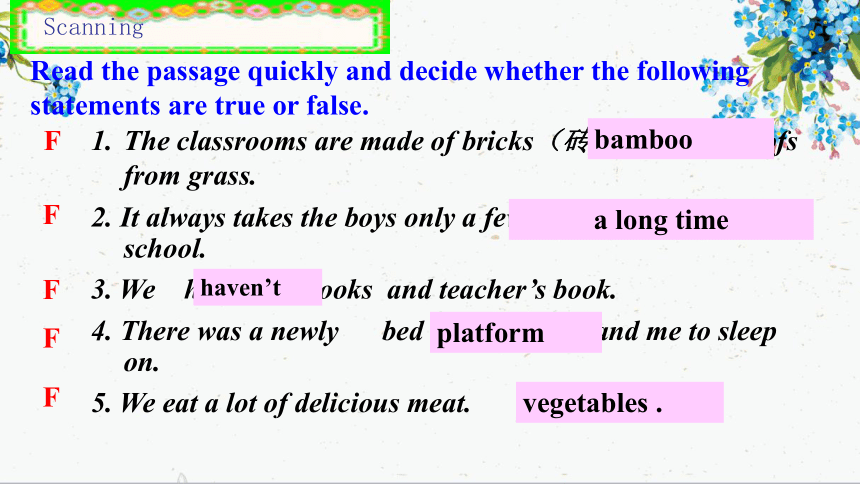
文档简介
(共35张PPT)
Unit
4
Sharing
Think
about
the
things
you
do
to
help
other
people.
Who
did
you
help
before?
People
who
help
others
in
their
community
or
outside
their
community
would
be
called
volunteers.
Volunteer
However,
they
would
not
be
called
volunteers
if
they
help
their
parents,
other
relatives
or
friends.
Teaching
the
kids
in
the
mountainous
areas
a
volunteer
teacher
Jo,a
young
Australian
woman,
was
a
volunteer
teacher
who
worked
in
Papua
New
Guinea
(PNG)
for
two
years.
A
Letter
Home
Pre-reading
1
who
wrote
the
letter?
2
who
was
she
?
Jo,
a
young
Australian
woman
who
has
worked
as
a
volunteer
teacher
in
Papua
New
Guinea
for
two
years.
Jo
What
do
you
know
about
Papua
New
Guinea?
It
is
situated
to
the
north
of
Australia
and
westsouthern
of
the
Pacific
Ocean
Scanning
Read
the
text
in
2
minutes
and
tell
us
what
Jo
talks
about
in
the
letter.
(main
idea)
A
LETTER
HOME
In
the
letter
,
Jo
talks
about
the
school
she
worked
and
the
life
in
the
village
she
visited
in
PNG
TASK
1
We
can
divide
it
into
four
parts,
and
summarize
what
each
part
is
about.
Part
1
(Paragraph
1)
Part
2
(Paragraph
2-3)
Part
3
(Paragraph
4-8)
Part
4
(Paragraph
9)
Topic
A)
The
school
where
Jo
worked
and
Jo’s
work
at
school.
B)
Jo
and
Jenny
visited
Tombe’s
home
in
the
village.
C)
Closing
of
the
letter.
D)
Opening
of
the
letter
and
introduction
to
what
will
be
talked
about
in
the
passage.
Reading---
Listening
and
Skimming
careful
reading
para
2—3
(school)
1
Every
morning
who
says
hello
to
Jo?
2
What
happened
in
the
science
lesson?
3
Why
do
you
think
the
boys
jumped
out
of
the
windows?
4
What
will
most
boys
do
after
year
8
?
The
boys
The
boys
jumped
out
of
the
window
when
they
saw
the
mixture
bubbling
over
everywhere
Because
they
have
never
come
across
this
kind
of
experiment
.
Most
of
them
will
go
back
to
their
villages
TASK
3
The
classrooms
are
made
of
bricks(砖)
and
the
roofs
from
grass.
2.
It
always
takes
the
boys
only
a
few
minutes
to
get
to
the
school.
3.
We
have
textbooks
and
teacher’s
book.
4.
There
was
a
newly
bed
for
Jenny
and
me
to
sleep
on.
5.
We
eat
a
lot
of
delicious
meat.
Read
the
passage
quickly
and
decide
whether
the
following
statements
are
true
or
false.
F
bamboo
F
F
a
long
time
haven’t
Scanning
platform
vegetables
.
F
F
Careful
reading
Read
the
passage
again
and
finish
the
chart.
Jo’s
high
school
It’s
a(n)
____
school–
the
classroom
are
made
of
____
and
the
roofs
from
grass.
There’s
no
____________
and
we
don’t
have
any
textbooks.
bush
bamboo
electricity
or
water
Jo’s
first
visit
to
a
village
Looks
of
a
man’s
house
The
house
is
a
low
bamboo____
with
____
sticking
out
of
the____.
Sleeping
arrangements
Jenny
and
I
sleep
on
a
newly
made
______.
Possessions
I
can
only
see
a
few__________.
Diet
We
eat
______,
______and
greens.
hut
grass
roof
platform
tin
plates
and
cups
and
a
couple
of
jars
sweet
potatoes
corn
Find
or
guess
the
reasons
for
these
facts
according
to
Jo’s
letter.
The
boys
jumped
out
of
the
windows
in
the
science
lesson.
Tombe’s
mother
cried
“ieee
ieee”
when
she
saw
Jo.
The
tin
can
was
standing
upside
down
on
the
grill.
Because
they
had
never
seen
anything
like
this
before.
It
was
her
way
to
welcome
visitors
to
the
village.
The
tin
can
was
used
to
dry
out
the
leftover
food,
which
might
attract
evil
spirits.
Summary
(Give
not
more
than
30
words)
The
passage
is
written
in
the
form
of
a
letter
by
a
young
________,
Jo.
It’s
about
her
experience
as
a
________
and
her
first
visit
to
a
_______
which
is
the
________
of
one
of
her
________.
volunteer
teacher
home
students
village
Language
points
Dear
Rosemary,
Thanks
for
your
letter,
which
took
a
fortnight
to
arrive.
It
was
wonderful
to
hear
from
you.
I
know
you're
dying
to
hear
all
about
my
life
here,
so
I've
included
some
photos
which
will
help
you
picture
the
places
I
talk
about.
which
引导非限制性定语从句,先行词是
letter
fortnight
n.
两星期
hear
from
收到…的信
hear
of
听说
be
dying
to
渴望,极想
Paragraph
1
4.
1)
die
for
为…而死
2)die
out
灭绝,消失
3)die
down
逐渐变弱,平息
4)die
of/from
因…而死
You
asked
about
my
high
school.
Well,
it's
a
bush
school
–
the
classrooms
are
made
of
bamboo
and
the
roofs
of
grass.
It
takes
me
only
a
few
minutes
to
walk
to
school
down
a
muddy
track.
When
I
reach
the
school
grounds
there
are
lots
of
"good
mornings"
for
me
from
the
boys.
Many
of
them
have
walked
a
long
way,
sometimes
up
to
two
hours,
to
get
to
school.
bush
n.
丛林
roof
n.屋顶
be
made
of
由…制成(看得出)
down
a
muddy
track
介词短语作状语
5.
muddy
adj.
泥泞的
6.
sometimes
up
to
two
hours
做插入语
Paragraph
2
There's
no
electricity
or
water
and
even
no
textbooks
either!
I'm
still
trying
to
adapt
to
these
conditions.
However,
one
thing
is
for
sure,
I've
become
more
imaginative
in
my
teaching.
Science
is
my
most
challenging
subject
as
my
students
have
no
concept
of
doing
experiments.
In
fact
there
is
no
equipment,
and
if
I
need
water
I
have
to
carry
it
from
my
house
in
a
bucket!
textbook
n.
课本
adapt
to
doing/n
适应
as
引导原因状语从句,“因为”
concept
n.
概念
5.
bucket
n.
水桶
Paragraph
3
The
other
day
I
was
showing
the
boys
the
weekly
chemistry
experiment
when,
before
I
knew
it,
the
mixture
was
bubbling
over
everywhere!
The
boys
who
had
never
come
across
anything
like
this
before
started
jumping
out
of
the
windows.
Sometimes
I
wonder
how
relevant
chemistry
is
to
these
students,
most
of
whom
will
be
going
back
to
their
villages
after
Year
8
anyway.
To
be
honest,
I
doubt
whether
I'm
making
any
difference
to
these
boys'
lives
at
all.
6.
The
other
day
不久前一天
7.
weekly
adj.每周的
8.
when
并列连词,连接并列句
9.
before
还没来得及…
10.
bubble
v.
气泡,沸腾
11.
come
across
偶然遇到/发现
12.
relevant
adj.相关的,切题的
13.
most
of
whom
引导非限制性定语从句,先行词为“to
these
students”
14.
There
is
no
doubt
that+句子
…毫无疑问
It
doubts
whether
+句子
…深表怀疑
15.
make
a
difference
有区别
Paragraph
3
6.
1)
the
other
day
指过去的某一天
2)one
day
“有一天,某日”
指过去或将来的某一天
3)some
day
“有朝一日,将来某一天”指将来的某一天
12.
1)
be
relevant
to
=be
related
to
=be
connected
with
=
be
associate
with与
…相关
2)have
(no)
relevance
to
和…(无)有关
You
asked
whether
I'm
getting
to
know
any
local
people.
Well,
that's
actually
quite
difficult
as
I
don't
speak
much
of
the
local
English
dialect
yet.
But
last
weekend
another
teacher,
Jenny,
and
1
did
visit
a
village
which
is
the
home
of
one
of
the
boys,
Tombe.
It
was
my
first
visit
to
a
remote
village.
whether]
“是否”
位于ask后,引导宾语从句
dialect
n.方言
which
引导定语从句,先行词是“a
village”
remote
adj.偏远的
Paragraph
4
We
walked
for
two
and
a
half
hours
to
get
there
-
first
up
a
mountain
to
a
ridge
from
where
we
had
fantastic
views
and
then
down
a
steep
path
to
the
valley
below.
When
we
arrived
at
the
village,
Tombe's
mother,
Kiak,
who
had
been
pulling
weeds
in
her
garden,
started
crying
"ieee
ieee".
We
shook
hands
with
all
the
villagers.
Everyone
seemed
to
be
a
relative
of
Tombe's.
5.
ridge
n.
屋脊,山脊
6.
from
where
引导定语从句,先行词是“a
ridge”
7.
steep
adj.
陡峭的
8.
who
引导定语从句,先行词为“Kiak”
9.
weed
n.
杂草,野草
;V.
除杂草/野草
10.
shake
hands
with
与…挥手
Paragraph
4
Tombe's
father,
Mukap,
led
us
to
his
house,
a
low
bamboo
hut
with
grass
sticking
out
of
the
roof
-
this
shows
it
is
a
man's
house.
The
huts
were
round,
not
rectangular
like
the
school
buildings.
There
were
no
windows
and
the
doorway
was
just
big
enough
to
get
through.
The
hut
was
dark
inside
so
it
took
time
for
our
eyes
to
adjust.
hut
n.
棚屋,小屋
with
grass
sticking
out
of
the
roof
with+宾+
Ving
Ved
to
do
介词词组
adj.
adv.
3.
rectangular
adj.
长方形的
4.
adjust
v.调整,适合
Paragraph
5
4.
1)
adjust
to
sth
适应sth
2)adjust…
to…
使…适应…
3)adjust
oneself
to
使自己适应
4)
make
an
adjustment
做出调整
Fresh
grass
had
been
laid
on
the
floor
and
there
was
a
newly
made
platform
for
Jenny
and
me
to
sleep
on.
Usually
Kiak
would
sleep
in
her
own
hut,
but
that
night
she
was
going
to
share
the
platform
with
us.
Mukap
and
Tombe
were
to
sleep
on
small
beds
in
another
part
of
the
hut.
There
was
a
fireplace
in
the
centre
of
the
hut
near
the
doorway.
The
only
possessions
I
could
see
were
one
broom,
a
few
tin
plates
and
cups
and
a
couple
of
jars.
5.
platform
n.
平台,讲台,月台
6.
possession
n.财产
7.
broom
n.
扫把
8.
tin
n.
锡
9.
jar
n.
罐子,广口瓶
Paragraph
5
Outside
Mukap
was
building
a
fire.
Once
the
fire
was
going,
he
laid
stones
on
it.
When
hot,
he
placed
them
in
an
empty
oil
drum
with
kau
kau
(sweet
potato),
corn
and
greens.
He
then
covered
the
vegetables
with
banana
leaves
and
left
them
to
steam.
I
sniffed
the
food;
it
smelled
delicious.
We
ate
inside
the
hut
sitting
round
the
fire.
I
loved
listening
to
the
family
softly
talking
to
each
other
in
their
language,
even
though
I
could
not
participate
the
conversation.
Luckily,
Tombe
could
be
our
interpreter.
When
hot=when
it
is
hot
sniff
v.闻,用鼻子嗅
participate
v.
加入,参与
interpreter
n.
翻译
5.
migration[ma??ɡre??n]
n.
迁移;移民
Paragraph
6
Later,
I
noticed
a
tin
can
standing
upside
down
on
the
grill
over
the
fire.
After
a
short
time
Tombe
threw
it
out
of
the
doorway.
I
was
puzzled.
Tombe
told
me
that
the
can
was
heated
to
dry
out
the
leftover
food.
They
believe
that
any
leftovers
attract
evil
spirits
in
the
night,
so
the
food
is
dried
up
in
the
can
and
the
can
is
then
thrown
out
of
the
hut.
Otherwise
they
don't
waste
anything.
grill
n.
烤架,大平底锅
v.烧烤
dry
out
(使浸水等之物)完全变干;干透
leftover
n.剩余物,残留物
adj.剩余的
evil
adj.
邪恶的
5.
dry
up
(使河流,井等)干涸
6.
otherwise
否则
Paragraph
7
We
left
the
village
the
next
morning
after
many
goodbyes
and
firm
handshakes.
My
muscles
were
aching
and
my
knees
shaking
as
we
climbed
down
the
mountain
towards
home.
That
evening
I
fell
happily
into
bed.
It
was
such
a
privilege
to
have
spent
a
day
with
Tombe's
family.
privilege
n.
特权,特别优待
Paragraph
8
It's
getting
late
and
I
have
to
prepare
tomorrow's
lessons
and
do
some
paperwork.
Please
write
soon.
Love
Jo
paperwork
n.
文书工作
Paragraph
9
小试牛刀
concept
weekly
relevant
remote
ajust
sniff
participate
otherwise
which
took
a
fortnight
to
arrive.
sometimes
up
to
two
hours
one
thing
is
for
sure
from
where
down
a
steep
path
When
hot
Unit
4
Sharing
Think
about
the
things
you
do
to
help
other
people.
Who
did
you
help
before?
People
who
help
others
in
their
community
or
outside
their
community
would
be
called
volunteers.
Volunteer
However,
they
would
not
be
called
volunteers
if
they
help
their
parents,
other
relatives
or
friends.
Teaching
the
kids
in
the
mountainous
areas
a
volunteer
teacher
Jo,a
young
Australian
woman,
was
a
volunteer
teacher
who
worked
in
Papua
New
Guinea
(PNG)
for
two
years.
A
Letter
Home
Pre-reading
1
who
wrote
the
letter?
2
who
was
she
?
Jo,
a
young
Australian
woman
who
has
worked
as
a
volunteer
teacher
in
Papua
New
Guinea
for
two
years.
Jo
What
do
you
know
about
Papua
New
Guinea?
It
is
situated
to
the
north
of
Australia
and
westsouthern
of
the
Pacific
Ocean
Scanning
Read
the
text
in
2
minutes
and
tell
us
what
Jo
talks
about
in
the
letter.
(main
idea)
A
LETTER
HOME
In
the
letter
,
Jo
talks
about
the
school
she
worked
and
the
life
in
the
village
she
visited
in
PNG
TASK
1
We
can
divide
it
into
four
parts,
and
summarize
what
each
part
is
about.
Part
1
(Paragraph
1)
Part
2
(Paragraph
2-3)
Part
3
(Paragraph
4-8)
Part
4
(Paragraph
9)
Topic
A)
The
school
where
Jo
worked
and
Jo’s
work
at
school.
B)
Jo
and
Jenny
visited
Tombe’s
home
in
the
village.
C)
Closing
of
the
letter.
D)
Opening
of
the
letter
and
introduction
to
what
will
be
talked
about
in
the
passage.
Reading---
Listening
and
Skimming
careful
reading
para
2—3
(school)
1
Every
morning
who
says
hello
to
Jo?
2
What
happened
in
the
science
lesson?
3
Why
do
you
think
the
boys
jumped
out
of
the
windows?
4
What
will
most
boys
do
after
year
8
?
The
boys
The
boys
jumped
out
of
the
window
when
they
saw
the
mixture
bubbling
over
everywhere
Because
they
have
never
come
across
this
kind
of
experiment
.
Most
of
them
will
go
back
to
their
villages
TASK
3
The
classrooms
are
made
of
bricks(砖)
and
the
roofs
from
grass.
2.
It
always
takes
the
boys
only
a
few
minutes
to
get
to
the
school.
3.
We
have
textbooks
and
teacher’s
book.
4.
There
was
a
newly
bed
for
Jenny
and
me
to
sleep
on.
5.
We
eat
a
lot
of
delicious
meat.
Read
the
passage
quickly
and
decide
whether
the
following
statements
are
true
or
false.
F
bamboo
F
F
a
long
time
haven’t
Scanning
platform
vegetables
.
F
F
Careful
reading
Read
the
passage
again
and
finish
the
chart.
Jo’s
high
school
It’s
a(n)
____
school–
the
classroom
are
made
of
____
and
the
roofs
from
grass.
There’s
no
____________
and
we
don’t
have
any
textbooks.
bush
bamboo
electricity
or
water
Jo’s
first
visit
to
a
village
Looks
of
a
man’s
house
The
house
is
a
low
bamboo____
with
____
sticking
out
of
the____.
Sleeping
arrangements
Jenny
and
I
sleep
on
a
newly
made
______.
Possessions
I
can
only
see
a
few__________.
Diet
We
eat
______,
______and
greens.
hut
grass
roof
platform
tin
plates
and
cups
and
a
couple
of
jars
sweet
potatoes
corn
Find
or
guess
the
reasons
for
these
facts
according
to
Jo’s
letter.
The
boys
jumped
out
of
the
windows
in
the
science
lesson.
Tombe’s
mother
cried
“ieee
ieee”
when
she
saw
Jo.
The
tin
can
was
standing
upside
down
on
the
grill.
Because
they
had
never
seen
anything
like
this
before.
It
was
her
way
to
welcome
visitors
to
the
village.
The
tin
can
was
used
to
dry
out
the
leftover
food,
which
might
attract
evil
spirits.
Summary
(Give
not
more
than
30
words)
The
passage
is
written
in
the
form
of
a
letter
by
a
young
________,
Jo.
It’s
about
her
experience
as
a
________
and
her
first
visit
to
a
_______
which
is
the
________
of
one
of
her
________.
volunteer
teacher
home
students
village
Language
points
Dear
Rosemary,
Thanks
for
your
letter,
which
took
a
fortnight
to
arrive.
It
was
wonderful
to
hear
from
you.
I
know
you're
dying
to
hear
all
about
my
life
here,
so
I've
included
some
photos
which
will
help
you
picture
the
places
I
talk
about.
which
引导非限制性定语从句,先行词是
letter
fortnight
n.
两星期
hear
from
收到…的信
hear
of
听说
be
dying
to
渴望,极想
Paragraph
1
4.
1)
die
for
为…而死
2)die
out
灭绝,消失
3)die
down
逐渐变弱,平息
4)die
of/from
因…而死
You
asked
about
my
high
school.
Well,
it's
a
bush
school
–
the
classrooms
are
made
of
bamboo
and
the
roofs
of
grass.
It
takes
me
only
a
few
minutes
to
walk
to
school
down
a
muddy
track.
When
I
reach
the
school
grounds
there
are
lots
of
"good
mornings"
for
me
from
the
boys.
Many
of
them
have
walked
a
long
way,
sometimes
up
to
two
hours,
to
get
to
school.
bush
n.
丛林
roof
n.屋顶
be
made
of
由…制成(看得出)
down
a
muddy
track
介词短语作状语
5.
muddy
adj.
泥泞的
6.
sometimes
up
to
two
hours
做插入语
Paragraph
2
There's
no
electricity
or
water
and
even
no
textbooks
either!
I'm
still
trying
to
adapt
to
these
conditions.
However,
one
thing
is
for
sure,
I've
become
more
imaginative
in
my
teaching.
Science
is
my
most
challenging
subject
as
my
students
have
no
concept
of
doing
experiments.
In
fact
there
is
no
equipment,
and
if
I
need
water
I
have
to
carry
it
from
my
house
in
a
bucket!
textbook
n.
课本
adapt
to
doing/n
适应
as
引导原因状语从句,“因为”
concept
n.
概念
5.
bucket
n.
水桶
Paragraph
3
The
other
day
I
was
showing
the
boys
the
weekly
chemistry
experiment
when,
before
I
knew
it,
the
mixture
was
bubbling
over
everywhere!
The
boys
who
had
never
come
across
anything
like
this
before
started
jumping
out
of
the
windows.
Sometimes
I
wonder
how
relevant
chemistry
is
to
these
students,
most
of
whom
will
be
going
back
to
their
villages
after
Year
8
anyway.
To
be
honest,
I
doubt
whether
I'm
making
any
difference
to
these
boys'
lives
at
all.
6.
The
other
day
不久前一天
7.
weekly
adj.每周的
8.
when
并列连词,连接并列句
9.
before
还没来得及…
10.
bubble
v.
气泡,沸腾
11.
come
across
偶然遇到/发现
12.
relevant
adj.相关的,切题的
13.
most
of
whom
引导非限制性定语从句,先行词为“to
these
students”
14.
There
is
no
doubt
that+句子
…毫无疑问
It
doubts
whether
+句子
…深表怀疑
15.
make
a
difference
有区别
Paragraph
3
6.
1)
the
other
day
指过去的某一天
2)one
day
“有一天,某日”
指过去或将来的某一天
3)some
day
“有朝一日,将来某一天”指将来的某一天
12.
1)
be
relevant
to
=be
related
to
=be
connected
with
=
be
associate
with与
…相关
2)have
(no)
relevance
to
和…(无)有关
You
asked
whether
I'm
getting
to
know
any
local
people.
Well,
that's
actually
quite
difficult
as
I
don't
speak
much
of
the
local
English
dialect
yet.
But
last
weekend
another
teacher,
Jenny,
and
1
did
visit
a
village
which
is
the
home
of
one
of
the
boys,
Tombe.
It
was
my
first
visit
to
a
remote
village.
whether]
“是否”
位于ask后,引导宾语从句
dialect
n.方言
which
引导定语从句,先行词是“a
village”
remote
adj.偏远的
Paragraph
4
We
walked
for
two
and
a
half
hours
to
get
there
-
first
up
a
mountain
to
a
ridge
from
where
we
had
fantastic
views
and
then
down
a
steep
path
to
the
valley
below.
When
we
arrived
at
the
village,
Tombe's
mother,
Kiak,
who
had
been
pulling
weeds
in
her
garden,
started
crying
"ieee
ieee".
We
shook
hands
with
all
the
villagers.
Everyone
seemed
to
be
a
relative
of
Tombe's.
5.
ridge
n.
屋脊,山脊
6.
from
where
引导定语从句,先行词是“a
ridge”
7.
steep
adj.
陡峭的
8.
who
引导定语从句,先行词为“Kiak”
9.
weed
n.
杂草,野草
;V.
除杂草/野草
10.
shake
hands
with
与…挥手
Paragraph
4
Tombe's
father,
Mukap,
led
us
to
his
house,
a
low
bamboo
hut
with
grass
sticking
out
of
the
roof
-
this
shows
it
is
a
man's
house.
The
huts
were
round,
not
rectangular
like
the
school
buildings.
There
were
no
windows
and
the
doorway
was
just
big
enough
to
get
through.
The
hut
was
dark
inside
so
it
took
time
for
our
eyes
to
adjust.
hut
n.
棚屋,小屋
with
grass
sticking
out
of
the
roof
with+宾+
Ving
Ved
to
do
介词词组
adj.
adv.
3.
rectangular
adj.
长方形的
4.
adjust
v.调整,适合
Paragraph
5
4.
1)
adjust
to
sth
适应sth
2)adjust…
to…
使…适应…
3)adjust
oneself
to
使自己适应
4)
make
an
adjustment
做出调整
Fresh
grass
had
been
laid
on
the
floor
and
there
was
a
newly
made
platform
for
Jenny
and
me
to
sleep
on.
Usually
Kiak
would
sleep
in
her
own
hut,
but
that
night
she
was
going
to
share
the
platform
with
us.
Mukap
and
Tombe
were
to
sleep
on
small
beds
in
another
part
of
the
hut.
There
was
a
fireplace
in
the
centre
of
the
hut
near
the
doorway.
The
only
possessions
I
could
see
were
one
broom,
a
few
tin
plates
and
cups
and
a
couple
of
jars.
5.
platform
n.
平台,讲台,月台
6.
possession
n.财产
7.
broom
n.
扫把
8.
tin
n.
锡
9.
jar
n.
罐子,广口瓶
Paragraph
5
Outside
Mukap
was
building
a
fire.
Once
the
fire
was
going,
he
laid
stones
on
it.
When
hot,
he
placed
them
in
an
empty
oil
drum
with
kau
kau
(sweet
potato),
corn
and
greens.
He
then
covered
the
vegetables
with
banana
leaves
and
left
them
to
steam.
I
sniffed
the
food;
it
smelled
delicious.
We
ate
inside
the
hut
sitting
round
the
fire.
I
loved
listening
to
the
family
softly
talking
to
each
other
in
their
language,
even
though
I
could
not
participate
the
conversation.
Luckily,
Tombe
could
be
our
interpreter.
When
hot=when
it
is
hot
sniff
v.闻,用鼻子嗅
participate
v.
加入,参与
interpreter
n.
翻译
5.
migration[ma??ɡre??n]
n.
迁移;移民
Paragraph
6
Later,
I
noticed
a
tin
can
standing
upside
down
on
the
grill
over
the
fire.
After
a
short
time
Tombe
threw
it
out
of
the
doorway.
I
was
puzzled.
Tombe
told
me
that
the
can
was
heated
to
dry
out
the
leftover
food.
They
believe
that
any
leftovers
attract
evil
spirits
in
the
night,
so
the
food
is
dried
up
in
the
can
and
the
can
is
then
thrown
out
of
the
hut.
Otherwise
they
don't
waste
anything.
grill
n.
烤架,大平底锅
v.烧烤
dry
out
(使浸水等之物)完全变干;干透
leftover
n.剩余物,残留物
adj.剩余的
evil
adj.
邪恶的
5.
dry
up
(使河流,井等)干涸
6.
otherwise
否则
Paragraph
7
We
left
the
village
the
next
morning
after
many
goodbyes
and
firm
handshakes.
My
muscles
were
aching
and
my
knees
shaking
as
we
climbed
down
the
mountain
towards
home.
That
evening
I
fell
happily
into
bed.
It
was
such
a
privilege
to
have
spent
a
day
with
Tombe's
family.
privilege
n.
特权,特别优待
Paragraph
8
It's
getting
late
and
I
have
to
prepare
tomorrow's
lessons
and
do
some
paperwork.
Please
write
soon.
Love
Jo
paperwork
n.
文书工作
Paragraph
9
小试牛刀
concept
weekly
relevant
remote
ajust
sniff
participate
otherwise
which
took
a
fortnight
to
arrive.
sometimes
up
to
two
hours
one
thing
is
for
sure
from
where
down
a
steep
path
When
hot
